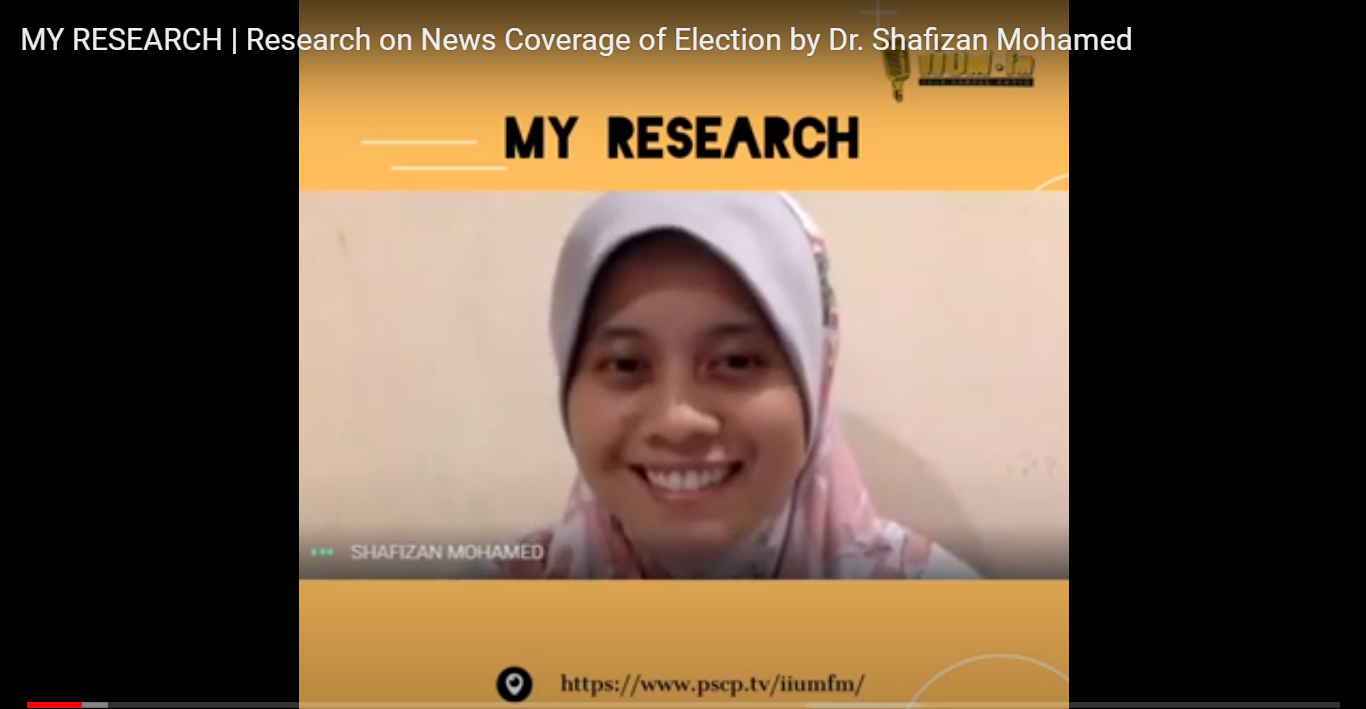By Iylia Marsya Iskandar
GOMBAK, 9 November 2020: The public should dictate the media and its content, not the other way around, thats why we need the public to be media literate, Dr. Shafizan Mohamed shared her views.
According to Dr. Shafizan, the role of the media on news coverage about elections is set to affect the perception of the majority, therefore this is where education on media literacy should come into play.
She believes that the law can play a significant part in regulating and setting the media agenda but the most ideal way is for society to control the media, that is, by being literate and in trying to understand how the media works.
Dr. Shafizan Mohamed, an academic researcher and assistant professor of the Department of Communication, Kulliyyah of Islamic Revealed Knowledge and Human Sciences (KIRKHS), shared her views on Political Communication on ‘My Research’ which was broadcast on IIUM.fm. today.
œIf there is too much sensationalised news, the audience can start boycotting the media or campaigning against them, Shafizan shared.
Youth and Politics
Dr. Shafizan called on Communication students to internalise the core value of what they are studying and not just to memorise the textbooks.
œPolitics is more than voting and what is in the newspaper. It is about knowing your responsibility and the reason for your vote,” she said.
Through her observation, Shafizan said that the youth are not interested in talking about politics but she believes that the youth should be the drivers.
“All politicians and parties have a certain stance, you have to be educated enough to choose which is the most relevant to your beliefs, Shafizan added.
Dr. Shafizan expressed that we do not need many people to be politicians but the youth must be aware of their political surroundings and what politics is doing to their lives.
œWe cannot wait for them to turn 50 then only they start to be involved in politics. We cannot afford to have a generational gap, she elaborated.
Interest in Politics
Dr. Shafizan who did her doctorate on Political Blogging has been interested in politics since she was young and had always been fascinated by the power struggle.
This has prompted Shafizan to do a research on media coverage on the 14th General Election which she described as œcontroversial and unique after being commissioned by the Head of the Election Studies Unit in IIUM, Prof. Dato’ Sri Dr. Syed Arabi Idid.
The research, centered around online news coverage including on social media.
She shared: œIt is also interesting to see how these politicians on Facebook where they personalised their image to influence the audience. This has made it interesting for me to study on the election.
Research on COVID-19
On COVID-19 pandemic, Dr. Shafizan shared that there were a few instances where her researches were affected as well.
œSince everything has to be done online, online hinders you from a wider coverage. Online surveys are easy if you want to get a general response, but it is hard to sample specific groups of people, she said.
Dr. Shafizans research on B40 children and media literacy has to be put on hold for a while as she cannot use online surveys for her sample, and even so, the survey still needs face-to-face interaction or they will not know how to answer the survey honestly.
However, it is hard for Shafizan to get significant data in online surveys but one of the silver linings in this pandemic is the birth of more research ideas.
Dr. Shafizans latest research is on content analysis on how media coverage on COVID-19 affects the coverage on politics. Shafizans interest is specifically on Malaysian media as Malaysia has interesting and controversial political stories.
Malaysia and US elections
In the future, she said, she would like to research the difference between Malaysian and American participation and contribution of the public in elections.
œIn the United States, we can see celebrities and the public telling other people, where there is more political maturity. In Malaysia, this is a taboo topic except for the extreme political supporters, Dr. Shafizan expressed.
Becoming a better lecturer
On her role of a lecturer and a researcher, Shafizan shared that she needs research to be a better lecturer and she also needs her students to be a better researcher.
She said: œHaving discussions with my students is interesting as sometimes they see things differently and point out new issues. From the discussions, I can know how students and young people are thinking.
When asked how she would improve news coverage, Shafizan said that there are already many suggestions and ethical principles that have been pointed out.
She said that her research will not add to that because we are already aware of the ideal way, but she hopes her research will help everyday people.
She said, œThe government and the media already know of the ideal and most ethical way but what I can do is to advise my students and everyday people. This is my kind of change.
‘My Research’ is a new educational programme on IIUM.fm where the programme goes behind the scenes on researches conducted by lecturers in IIUM.
Readers who are interested to listen to the full interview with Dr. Shafizan can click here.***
